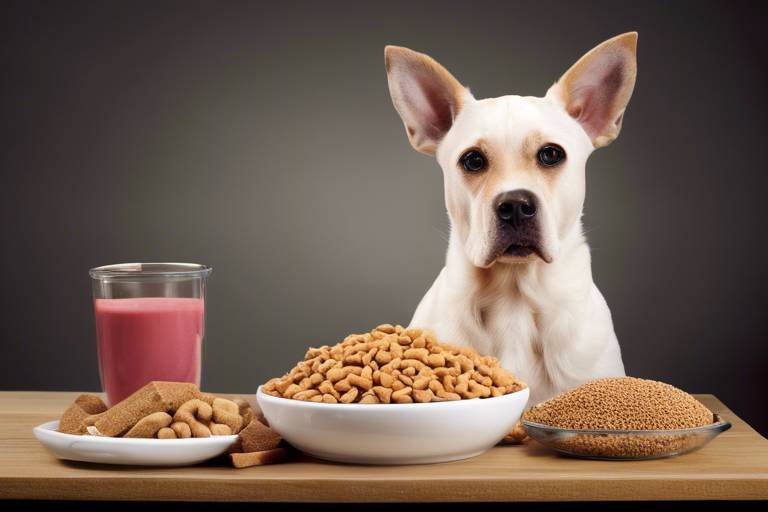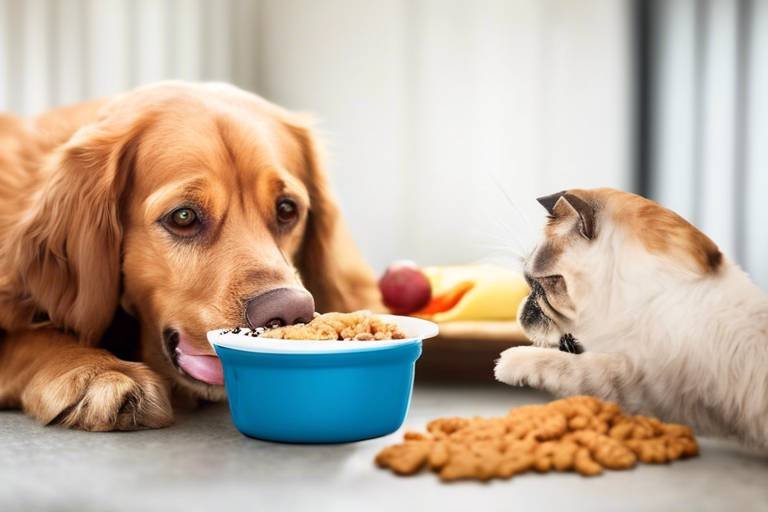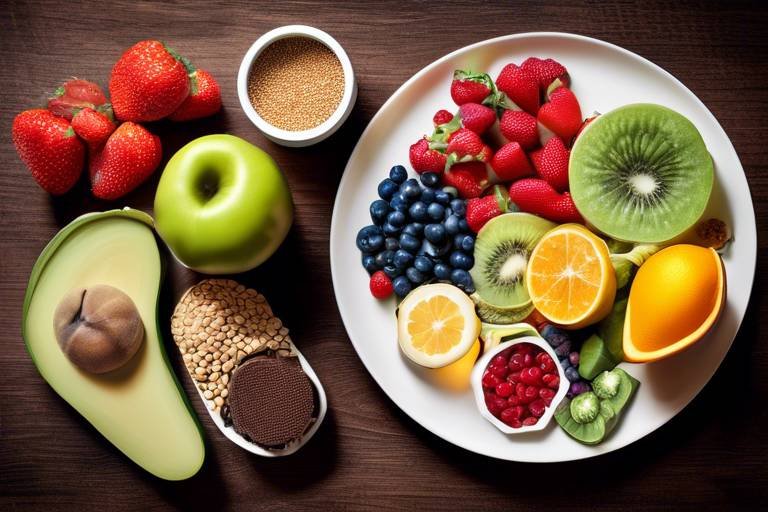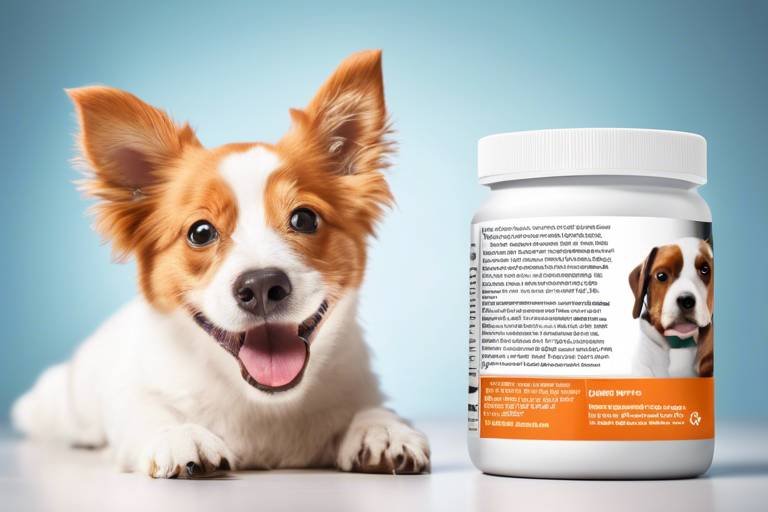The Benefits of Using Organic Pet Products
When it comes to our beloved furry friends, we all want the absolute best for them. Choosing organic pet products is not just a trend; it's a lifestyle choice that can significantly enhance your pet's quality of life. Imagine giving your pet the same care you would give to yourself—choosing organic means opting for healthier ingredients, supporting the environment, and fostering a deeper bond with your pet. This article dives into the numerous advantages of selecting organic products for your pets, highlighting health benefits, environmental impacts, and overall well-being.
One of the most compelling reasons to switch to organic pet products is the quality of the ingredients. Organic pet foods are crafted from natural ingredients that are free from harmful chemicals and additives. This means that every bite your pet takes is packed with nutrients that promote better health. Think about it—would you want to consume food laced with artificial preservatives and fillers? Of course not! By choosing organic, you are ensuring your pet consumes a diet that reduces the risk of allergies and digestive issues. For instance, many pets struggle with food sensitivities, and organic products typically have limited ingredient lists, making it easier to identify potential allergens.
Using organic pet products isn't just beneficial for your pet; it's a step toward a healthier planet. Organic farming practices prioritize sustainability, which means they often reduce pollution and promote biodiversity. This is crucial because a thriving ecosystem benefits not only pets but also the environment as a whole. When you choose organic, you're part of a larger movement that aims to protect our planet. It's like planting a seed for a better future—one where our pets can thrive in a clean and healthy environment.
One of the often-overlooked benefits of organic farming is the reduction of chemical runoff. Traditional farming methods rely heavily on pesticides and fertilizers, which can wash into waterways and harm aquatic ecosystems. Organic farming minimizes chemical usage, leading to cleaner water for both pets and humans. Imagine the difference this can make for the rivers and lakes your pets love to splash around in!
Many organic pet products are sourced from farms that prioritize animal welfare and environmental stewardship. By choosing these products, you are not only ensuring your pet gets the best but also supporting ethical practices. It's like giving a high-five to local farmers who care about their animals and the land. When you purchase organic, you're part of a movement that values sustainability and compassion.
Did you know that pets fed organic diets often exhibit improved behavior and energy levels? It's true! The absence of artificial additives can lead to calmer, happier pets. Just like us, pets can react negatively to processed foods. By providing them with organic options, you can enhance the bond between you and your furry friend. A well-fed pet is a happy pet, and a happy pet is a joy to have around!
Another significant advantage of organic pet food is its impact on digestive health. Organic ingredients are generally easier for pets to digest, which can lead to fewer gastrointestinal issues. A healthy gut contributes to overall well-being and vitality in pets. Imagine your pet running around with boundless energy, all thanks to a diet that supports their digestive system!
Food allergies can be a nightmare for both pets and their owners. Fortunately, organic products, with their limited ingredients and natural components, can help identify and manage these allergies effectively. By opting for organic, you can provide your pet with a diet that is less likely to trigger allergic reactions. It's like giving your pet a tailored meal plan that suits their unique needs!
Choosing organic pet products often means supporting local farmers and businesses. This not only boosts the local economy but also promotes community sustainability and ethical practices. When you buy local, you’re investing in your community and ensuring that your purchases support those who care about quality and ethics.
Local organic producers frequently engage with their communities, offering educational resources and events that promote pet health and wellness. This creates a supportive network for pet owners, making it easier for you to connect with others who share your passion for pets and sustainability. It’s like joining a club where everyone is committed to the well-being of their furry friends!
Organic brands typically prioritize transparency, allowing consumers to know where their pet's food comes from and how it is made. This fosters trust and informed choices for pet owners. You wouldn’t want to feed your pet something without knowing its origins, right? With organic products, you can feel confident that you’re making the best choices for your pet’s health and happiness.
- What are organic pet products? Organic pet products are made from natural ingredients without harmful chemicals or additives.
- Are organic pet foods better for my pet? Yes, they often lead to better health, improved behavior, and fewer allergies.
- How do I know if a pet product is organic? Look for certifications on the packaging, such as USDA Organic.
- Can organic products be more expensive? They can be, but the health benefits and environmental impact often justify the cost.

Healthier Ingredients
When it comes to our beloved pets, the importance of in their diets cannot be overstated. Just like us, pets thrive on a diet rich in natural, wholesome components. Organic pet products are crafted with natural ingredients that are free from harmful chemicals, artificial preservatives, and synthetic additives. This means that what you're feeding your furry friend is not only nutritious but also safe. Imagine feeding your pet a meal that is as clean and pure as the food you would choose for yourself. It’s a win-win situation!
Many pets suffer from allergies and digestive issues, often triggered by the artificial additives found in conventional pet foods. By opting for organic products, you significantly reduce the risk of these problems. Organic pet foods typically contain a limited number of ingredients, which can help in identifying any potential allergens. For instance, if your dog has a sensitive stomach, switching to an organic diet can lead to a noticeable improvement in their overall health and happiness. You might even find that your pet has more energy and a shinier coat!
Let's take a closer look at some of the benefits of these healthier ingredients:
- Natural Nutrients: Organic pet foods are packed with essential vitamins and minerals that are crucial for your pet's health.
- Fewer Allergens: With fewer ingredients and no artificial additives, the risk of allergic reactions is significantly minimized.
- Better Digestion: Organic ingredients are generally easier for pets to digest, leading to improved gastrointestinal health.
Moreover, the sourcing of these ingredients is often done with a focus on sustainability and ethical practices. Many organic pet food brands prioritize using meats from animals raised in humane conditions, which is not only beneficial for your pet but also for the animals involved. When you choose organic, you're not just making a choice for your pet; you're supporting a system that values animal welfare and promotes a healthier planet.
In conclusion, the shift towards organic pet products is more than just a trend; it's a commitment to providing your pets with the best possible nutrition. By choosing organic, you're ensuring that your furry companions receive the healthiest ingredients available, paving the way for longer, happier lives. So next time you’re at the pet store, take a moment to consider what you’re putting in your pet's bowl. After all, their well-being is worth it!
Q: What are the main benefits of organic pet food?
A: Organic pet food offers healthier ingredients, fewer allergens, better digestion, and supports sustainable farming practices.
Q: Can organic pet food help with my pet's allergies?
A: Yes! Organic pet foods often contain limited ingredients and no artificial additives, which can help identify and manage food allergies.
Q: Is organic pet food more expensive than conventional pet food?
A: While organic pet food can be pricier, the health benefits and quality ingredients often justify the cost for many pet owners.
Q: How can I find quality organic pet products?
A: Look for products that have certified organic labels and check the ingredient list for transparency in sourcing.
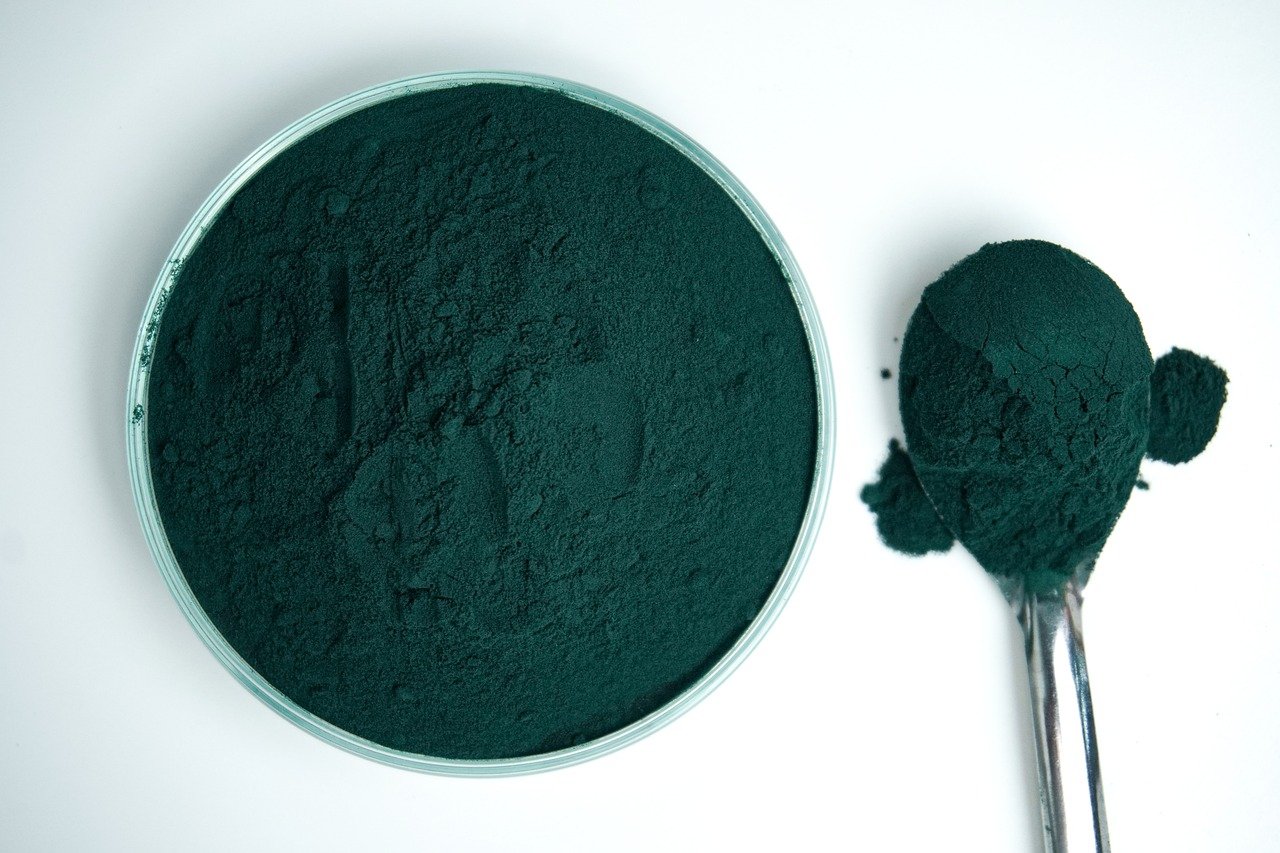
Environmental Impact
This article explores the numerous advantages of choosing organic products for pets, including health benefits, environmental impact, and overall well-being for your furry friends.
Organic pet products are made with natural ingredients, free from harmful chemicals and additives. This ensures your pet consumes a diet that promotes better health and reduces the risk of allergies and digestive issues.
When it comes to our beloved pets, we often think about their health and happiness, but what about the environment they live in? Choosing organic pet products is not just a personal choice; it's a step towards a healthier planet. These products are typically produced using sustainable farming practices that prioritize the well-being of the earth. By opting for organic, you're not only ensuring that your pet receives the best possible nutrition, but you're also contributing to a larger movement that fights against environmental degradation.
One significant advantage of organic farming is the reduction of chemical runoff. Traditional farming methods often rely heavily on synthetic fertilizers and pesticides, which can seep into waterways and harm aquatic ecosystems. Organic practices, on the other hand, minimize the use of these harmful substances, leading to cleaner water for both pets and humans. Imagine a world where your pet can play in rivers and lakes without the worry of toxic chemicals—this is the future that organic farming aims to create.
Moreover, many organic pet products are sourced from sustainable farms that prioritize animal welfare and environmental stewardship. This means that your purchases support ethical practices. You’re not just buying food; you’re investing in a system that values the earth and its creatures. By choosing organic, you're helping to promote biodiversity, which is crucial for maintaining healthy ecosystems. It’s like planting a seed of change that can grow into something beautiful for generations to come.
Here's a quick look at how organic pet products positively impact the environment:
| Benefit | Description |
|---|---|
| Reduction of Chemical Use | Less reliance on synthetic fertilizers and pesticides leads to a healthier ecosystem. |
| Support for Biodiversity | Organic farming practices encourage a variety of plant and animal life. |
| Sustainable Practices | Many organic farms engage in methods that protect the environment and promote animal welfare. |
In conclusion, the environmental impact of choosing organic pet products is profound. By making this choice, you are not only enhancing the life of your pet but also contributing to a healthier planet. So next time you’re at the pet store, think about the bigger picture. Your decision can lead to a ripple effect of positive change that benefits everyone, including your furry friend.
Pets fed organic diets often exhibit better behavior and energy levels. The absence of artificial additives can lead to calmer, happier pets, enhancing the bond between pet and owner.
Organic ingredients are easier for pets to digest, which can lead to fewer gastrointestinal issues. A healthy gut contributes to overall well-being and vitality in pets.
Many pets suffer from food allergies. Organic products, with their limited ingredients and natural components, can help identify and manage these allergies effectively.
Choosing organic pet products often means supporting local farmers and businesses. This not only boosts the local economy but also promotes community sustainability and ethical practices.
Local organic producers often engage with their communities, offering educational resources and events that promote pet health and wellness, creating a supportive network for pet owners.
Organic brands typically prioritize transparency, allowing consumers to know where their pet's food comes from and how it is made, fostering trust and informed choices for pet owners.
- What are organic pet products? Organic pet products are made from natural ingredients without synthetic additives or chemicals.
- Are organic pet products better for my pet? Yes, they often provide healthier nutrition and reduce the risk of allergies and digestive issues.
- How do organic products impact the environment? Organic farming reduces chemical runoff, supports biodiversity, and promotes sustainable practices.
- Can I find organic pet products locally? Many local farmers and businesses offer organic options, supporting your community and your pets.
Reduction of Chemical Runoff
When we talk about the benefits of using organic pet products, one aspect that often flies under the radar is the . You might be wondering, "What’s the big deal about chemical runoff?" Well, let me break it down for you. Chemical runoff occurs when fertilizers, pesticides, and other chemicals used in conventional farming wash away into our waterways. This can lead to a plethora of environmental issues, including water pollution and harm to aquatic life. By choosing organic products for your pets, you’re not just making a healthy choice for them; you’re also making a conscious decision to protect our precious ecosystems.
Organic farming practices are designed to minimize the use of harmful chemicals. Instead of synthetic fertilizers and pesticides, organic farmers rely on natural alternatives, which significantly reduces the likelihood of these substances contaminating our water supply. For instance, organic farms often use compost, crop rotation, and natural pest control methods, which are not only safer for the environment but also enhance soil health. This means that when it rains, the water that runs off these farms is far less likely to carry harmful chemicals into streams and rivers.
To give you a clearer picture, here’s a comparison of conventional versus organic farming practices:
| Aspect | Conventional Farming | Organic Farming |
|---|---|---|
| Chemical Use | High levels of synthetic fertilizers and pesticides | No synthetic chemicals; uses natural alternatives |
| Soil Health | Often depleted and reliant on chemical inputs | Enhanced through natural compost and crop rotation |
| Water Contamination | High risk of runoff into waterways | Significantly lower risk of chemical runoff |
Moreover, the benefits of reduced chemical runoff extend beyond just the environment. Cleaner waterways mean healthier ecosystems, which in turn leads to a more balanced environment for all living beings, including our beloved pets. Healthy aquatic ecosystems provide clean water sources that are essential not only for wildlife but also for us humans and, of course, our furry friends. So, every time you choose organic pet products, you're contributing to a larger cause—one that champions a sustainable future.
In conclusion, the reduction of chemical runoff is a crucial benefit of opting for organic pet products. It’s a win-win situation: you’re ensuring that your pets consume healthier ingredients while also doing your part to protect the environment. So, the next time you’re shopping for your pet, remember that your choices matter, not just for their health but for the health of our planet as well.
- What are organic pet products? Organic pet products are made from natural ingredients without synthetic chemicals, pesticides, or genetically modified organisms.
- Are organic pet products more expensive? While they can be pricier, many pet owners find the health benefits and environmental impact worth the investment.
- How can I tell if a pet product is organic? Look for certifications on the packaging, such as the USDA Organic seal.
- Will my pet like organic food? Many pets enjoy the taste of organic food, and it can lead to improved overall health and behavior.
Sustainable Sourcing
This article explores the numerous advantages of choosing organic products for pets, including health benefits, environmental impact, and overall well-being for your furry friends.
Organic pet products are made with natural ingredients, free from harmful chemicals and additives. This ensures your pet consumes a diet that promotes better health and reduces the risk of allergies and digestive issues.
Using organic pet products contributes to a healthier planet. These products are often produced sustainably, reducing pollution and promoting biodiversity, which benefits not only pets but the environment as a whole.
Organic farming practices minimize chemical usage, leading to less runoff into waterways. This helps protect aquatic ecosystems and ensures cleaner water for both pets and humans.
Sustainable sourcing is at the heart of organic pet products, ensuring that every ingredient is not just good for your pet but also good for the planet. When you choose organic, you’re supporting farms that prioritize ethical practices and environmental stewardship. These farms often use methods that enhance soil health and biodiversity, creating a ripple effect that benefits the entire ecosystem.
Many organic pet products are sourced from local farms that adhere to sustainable practices. This means that the ingredients are grown without synthetic pesticides and fertilizers, which can be harmful to both pets and the environment. By supporting these farms, you're not just choosing a healthier option for your furry friend; you're also contributing to a system that values animal welfare and community well-being.
Furthermore, sustainable sourcing often involves:
- Crop Rotation: This practice helps maintain soil fertility and prevents pest buildup, reducing the need for chemical interventions.
- Water Conservation: Sustainable farms use methods that minimize water usage, ensuring that this precious resource is preserved for future generations.
- Habitat Preservation: By choosing organic, you support farming practices that protect natural habitats, which in turn supports local wildlife.
In essence, when you opt for organic pet products, you are making a conscious choice that echoes beyond your pet's bowl. You are investing in a sustainable future, where both pets and the planet can thrive together.
Pets fed organic diets often exhibit better behavior and energy levels. The absence of artificial additives can lead to calmer, happier pets, enhancing the bond between pet and owner.
Organic ingredients are easier for pets to digest, which can lead to fewer gastrointestinal issues. A healthy gut contributes to overall well-being and vitality in pets.
Many pets suffer from food allergies. Organic products, with their limited ingredients and natural components, can help identify and manage these allergies effectively.
Choosing organic pet products often means supporting local farmers and businesses. This not only boosts the local economy but also promotes community sustainability and ethical practices.
Local organic producers often engage with their communities, offering educational resources and events that promote pet health and wellness, creating a supportive network for pet owners.
Organic brands typically prioritize transparency, allowing consumers to know where their pet's food comes from and how it is made, fostering trust and informed choices for pet owners.
Q: Why should I choose organic pet products?
A: Organic pet products are free from harmful chemicals and additives, promoting better health for your pet and a healthier environment.
Q: Are organic pet products more expensive?
A: While they may have a higher upfront cost, the long-term health benefits for your pet can outweigh the initial investment.
Q: How do I know if a pet product is truly organic?
A: Look for certification labels from recognized organic certifying bodies, which ensure that the product meets strict organic standards.

Improved Pet Behavior
When it comes to our beloved furry companions, their behavior is a crucial aspect of their overall happiness and well-being. You might be surprised to learn that the food we provide them can significantly influence their temperament and energy levels. Feeding your pet organic products can lead to noticeable improvements in their behavior, making them not just healthier, but also happier. Imagine a dog that used to be hyperactive and anxious turning into a calm and content companion simply by switching to an organic diet. It’s like giving them a breath of fresh air!
One of the primary reasons organic diets can enhance pet behavior is due to the absence of artificial additives and preservatives. Many conventional pet foods are packed with chemicals that can cause hyperactivity and irritability. By choosing organic options, you’re eliminating these potential triggers, allowing your pet to feel more balanced and relaxed. It’s almost like swapping a rollercoaster ride for a peaceful stroll in the park!
Moreover, organic ingredients are often more digestible for pets. When pets consume food that is easier on their digestive systems, they tend to experience fewer gastrointestinal issues. A healthy gut can lead to a happier pet, and a happy pet is less likely to engage in destructive behaviors. Think of it this way: if you were constantly dealing with stomach cramps and discomfort, wouldn’t you be a bit cranky too? By providing organic food, you’re ensuring your pet feels good both inside and out.
Another factor to consider is the impact of nutrition on a pet's energy levels. Organic diets are typically richer in nutrients, which can provide pets with sustained energy throughout the day. This means they are less likely to exhibit erratic behavior due to energy spikes and crashes. Instead, they can enjoy a more stable mood, leading to better interactions with their human companions and other pets. It’s like fueling a car with high-quality gasoline; it runs smoother and performs better!
In addition to these benefits, many pet owners report that their pets become more trainable when on an organic diet. The increased focus and calmness that come with better nutrition can make training sessions more effective and enjoyable. A dog that is attentive and eager to learn is a joy to work with, and it strengthens the bond between pet and owner. This transformation can be likened to a light bulb switching on; suddenly, everything becomes clearer, and communication flows effortlessly.
In summary, the choice to feed your pet organic products can lead to improved behavior, a calmer demeanor, and a stronger bond between you and your furry friend. By prioritizing their dietary needs, you’re not just investing in their health, but also in a happier, more harmonious home environment.
- What are organic pet products? Organic pet products are made with natural ingredients that are free from synthetic chemicals, pesticides, and additives.
- Will switching to organic food change my pet's behavior? Yes, many pet owners observe improved behavior in their pets after switching to organic food due to the absence of artificial additives and better digestion.
- Are organic pet products more expensive? While they may be slightly pricier, the benefits to your pet's health and behavior can outweigh the costs.
- How can I find high-quality organic pet products? Look for brands that are certified organic and prioritize transparency in their ingredient sourcing and production processes.
Digestive Health
This article explores the numerous advantages of choosing organic products for pets, including health benefits, environmental impact, and overall well-being for your furry friends.
Organic pet products are made with natural ingredients, free from harmful chemicals and additives. This ensures your pet consumes a diet that promotes better health and reduces the risk of allergies and digestive issues.
Using organic pet products contributes to a healthier planet. These products are often produced sustainably, reducing pollution and promoting biodiversity, which benefits not only pets but the environment as a whole.
Organic farming practices minimize chemical usage, leading to less runoff into waterways. This helps protect aquatic ecosystems and ensures cleaner water for both pets and humans.
Many organic pet products are sourced from sustainable farms that prioritize animal welfare and environmental stewardship, ensuring that your purchases support ethical practices.
Pets fed organic diets often exhibit better behavior and energy levels. The absence of artificial additives can lead to calmer, happier pets, enhancing the bond between pet and owner.
When it comes to your pet's digestive health, the choice of food plays a pivotal role. Organic ingredients are not just a trend; they are a vital part of ensuring that your furry friend has a thriving digestive system. Unlike conventional pet foods, which may contain fillers and artificial additives, organic pet food is crafted with high-quality, easily digestible ingredients. This means your pet can absorb nutrients more effectively, leading to fewer gastrointestinal issues.
Many pet owners report that switching to organic diets has resulted in noticeable improvements in their pets' digestion. For example, pets may experience:
- Fewer instances of vomiting or diarrhea
- Reduced flatulence
- Less bloating and discomfort
The natural fibers found in organic ingredients also contribute to a healthy gut. Just as we benefit from a diet rich in fiber, so do our pets. Fiber aids in maintaining regular bowel movements and supports the growth of beneficial gut bacteria, which are essential for overall health. Think of it as giving your pet a natural probiotic boost!
Moreover, many organic pet foods are formulated with specific digestive health in mind, incorporating ingredients like pumpkin, sweet potatoes, and probiotics. These ingredients not only soothe the digestive tract but also ensure that your pet’s gut flora remains balanced. A healthy gut is akin to a well-tuned engine; it keeps everything running smoothly and efficiently. So, if you want your pet to feel their best, consider making the switch to organic!
Many pets suffer from food allergies. Organic products, with their limited ingredients and natural components, can help identify and manage these allergies effectively.
Choosing organic pet products often means supporting local farmers and businesses. This not only boosts the local economy but also promotes community sustainability and ethical practices.
Local organic producers often engage with their communities, offering educational resources and events that promote pet health and wellness, creating a supportive network for pet owners.
Organic brands typically prioritize transparency, allowing consumers to know where their pet's food comes from and how it is made, fostering trust and informed choices for pet owners.
Q1: Are organic pet products more expensive?
A1: While organic pet products can be pricier than conventional options, many pet owners find the benefits outweigh the costs, especially regarding their pet's health and well-being.
Q2: How can I tell if a pet product is truly organic?
A2: Look for certification labels from recognized organizations, which indicate that the product meets organic standards.
Q3: Can organic pet food help with my pet's allergies?
A3: Yes! Organic pet food often contains fewer allergens and more natural ingredients, making it easier to identify and manage food allergies.
Q4: Is it safe to switch my pet to organic food suddenly?
A4: It's best to transition gradually to avoid digestive upset. Mix the organic food with your pet's current food over several days.
Allergy Management
Managing allergies in pets can often feel like navigating a minefield. One minute, your furry friend is happy and playful, and the next, they’re scratching, sneezing, or experiencing digestive issues. This is where organic pet products come into play, offering a beacon of hope for pet owners dealing with food allergies. You see, many pets suffer from sensitivities to certain ingredients found in conventional pet foods, which often contain artificial additives, fillers, and low-quality proteins. These can trigger allergic reactions, leading to discomfort and health problems.
Organic products, on the other hand, typically contain fewer ingredients, and those ingredients are sourced from natural, high-quality sources. This means that your pet is less likely to encounter allergens that can cause adverse reactions. For example, if your dog is allergic to grains or certain proteins, organic brands often provide options that are grain-free or use novel protein sources like duck or venison, which your pet may not have been exposed to before. This can be a game-changer in identifying and managing food allergies.
Moreover, organic pet foods tend to have a clearer ingredient list. This transparency allows you to pinpoint potential allergens more easily. You can look for specific ingredients that your pet tolerates well and avoid those that cause issues. For instance, if you notice that your pet thrives on a diet rich in organic sweet potatoes and fish, you can confidently choose products that feature those ingredients prominently. This tailored approach not only helps in managing allergies but also promotes a healthier, more balanced diet for your pet.
Additionally, many organic brands focus on using limited-ingredient formulas, which can significantly aid in allergy management. These formulas reduce the number of potential allergens your pet might encounter, making it easier to track down what works and what doesn't. If you're unsure about what to choose, consulting with a veterinarian can provide personalized recommendations based on your pet's specific needs.
Ultimately, switching to organic pet products can lead to a happier, healthier pet. By minimizing exposure to harmful additives and focusing on high-quality, natural ingredients, you’re not just helping your pet manage allergies, but you’re also investing in their overall well-being. Remember, a well-fed pet is a happy pet!
- What are the signs of food allergies in pets? Common signs include itching, excessive scratching, ear infections, and gastrointestinal problems like vomiting or diarrhea.
- How can I determine if my pet has a food allergy? A veterinarian can help diagnose food allergies through elimination diets and allergy tests.
- Are organic pet products more expensive? While they can be pricier, many pet owners find the health benefits and peace of mind worth the investment.
- Can I make homemade organic pet food? Yes, but it's crucial to ensure that the diet is balanced and meets your pet's nutritional needs. Consulting a vet or pet nutritionist is advisable.

Supporting Local Businesses
When you choose organic pet products, you're not just making a decision for your furry friend; you're also making a significant impact on your community. Supporting local businesses means that your purchases are helping to sustain the livelihoods of farmers and producers in your area. Instead of funneling your money into large corporations that may not prioritize ethical practices, you’re investing in the very fabric of your community. This connection fosters a sense of belonging and encourages more sustainable practices that benefit everyone.
Local organic producers often prioritize quality over quantity, which means that the products they offer are often fresher and more nutritious. When you buy from them, you can be confident that you’re giving your pet the best. Moreover, these businesses frequently engage with their communities, providing educational resources and hosting events that promote pet health and wellness. This creates a supportive network for pet owners, where they can share experiences, tips, and even recipes for homemade pet treats.
Another advantage of supporting local businesses is the transparency in production. Unlike large-scale manufacturers, local organic brands often provide detailed information about where their ingredients come from and how their products are made. This transparency fosters trust and allows consumers to make informed choices about what they feed their pets. You might find yourself feeling more connected to the source of your pet's food, knowing that it comes from a local farm that prioritizes ethical practices.
In addition to enhancing your pet's diet, supporting local businesses helps stimulate the local economy. When you spend your dollars at local shops, those funds often circulate within the community, creating jobs and supporting local initiatives. It's a win-win situation: your pet gets high-quality, organic products, and your community thrives. So the next time you’re shopping for pet supplies, consider opting for local organic options. You’ll be doing your part to support not just your pet’s health but also the health of your community.
- Why should I choose organic pet products over conventional ones? Organic pet products are made with natural ingredients, which are free from harmful chemicals and additives. This can lead to better health for your pet and a reduced risk of allergies.
- How do organic products impact the environment? Organic farming practices minimize chemical usage and promote biodiversity, contributing to a healthier planet.
- Can organic food help with my pet's allergies? Yes! Organic products often contain limited ingredients and natural components, making it easier to identify and manage food allergies.
- How do I find local organic pet product suppliers? Look for farmers' markets, local pet stores, and online directories that focus on organic and sustainable products in your area.
Community Engagement
When you choose organic pet products, you're not just making a decision for your furry friend; you're also becoming part of a larger community that values health, sustainability, and ethical practices. Local organic producers often go above and beyond to engage with their communities, creating a network of support that benefits both pets and their owners. These producers typically host events such as workshops, pet health fairs, and community gatherings that focus on educating pet owners about the importance of nutrition and wellness.
Imagine walking into a local farmers' market, where the air is filled with the scent of fresh produce and the sounds of laughter and excitement. You might find a booth dedicated to organic pet products, where passionate vendors share their knowledge about the ingredients they use and the benefits of choosing organic. This creates an opportunity for pet owners to ask questions, learn about the sourcing of products, and even sample treats for their pets. Such interactions foster a sense of belonging and trust, which is essential for making informed choices for our beloved companions.
Moreover, local organic producers often collaborate with veterinarians and pet trainers to provide valuable resources and guidelines. This partnership helps to create a well-rounded approach to pet health, ensuring that pet owners have access to the latest information and best practices. By participating in these community initiatives, you're not only supporting the local economy but also contributing to a more informed and health-conscious community. It's a win-win situation for everyone involved!
In addition, many organic brands prioritize transparency in their production methods. They are eager to share their stories, detailing how their products are made and where the ingredients are sourced. This openness builds trust between consumers and producers, allowing pet owners to feel confident about the choices they make. So, the next time you reach for that organic pet food or treat, remember that you're not just feeding your pet; you're also supporting a community that cares about health, sustainability, and ethical practices.
- What are the main benefits of using organic pet products? Organic pet products are free from harmful chemicals, promote better health, and support sustainable farming practices.
- How do organic products affect my pet's behavior? Pets that consume organic diets often exhibit improved behavior and energy levels due to the absence of artificial additives.
- Are organic pet products more expensive? While they may have a higher upfront cost, the long-term health benefits and support for local economies often outweigh the price difference.
- How can I find local organic pet product suppliers? Check local farmers' markets, pet stores, and online directories to discover organic suppliers in your area.
Transparency in Production
When it comes to choosing the right products for our beloved pets, transparency is key. Organic brands typically prioritize transparency in their production processes, allowing pet owners to know exactly what goes into their furry friends' food. This level of openness fosters trust and helps consumers make informed choices. After all, wouldn’t you want to know what you’re feeding your pet? Imagine walking into a grocery store and finding labels that not only list ingredients but also provide detailed information about the sourcing and manufacturing practices. This is the kind of clarity that organic pet products strive to achieve.
One of the most significant advantages of transparency in production is the ability to trace the origin of the ingredients. Many organic pet food brands offer detailed information about where their ingredients come from, including the farms and facilities involved in the production process. This means that pet owners can feel confident that they are supporting ethical practices and sustainable farming. For example, a label might indicate that the chicken used in the pet food is sourced from a local farm that practices humane animal husbandry. This connection to local producers not only enhances the quality of the food but also supports the community.
Furthermore, transparency extends beyond just ingredient sourcing. It involves clear communication about the manufacturing processes as well. Organic brands often provide insights into how their products are made, ensuring that no harmful chemicals or artificial additives are used. This level of detail can be comforting for pet owners who are increasingly concerned about the health implications of what they feed their pets. By knowing that their pet's food is made with care and consideration, owners can feel more at ease, which in turn strengthens the bond between them and their pets.
To illustrate this point, let’s take a look at a comparison of transparency practices between conventional and organic pet food brands:
| Aspect | Conventional Brands | Organic Brands |
|---|---|---|
| Ingredient Sourcing | Often vague, with little information on origin | Detailed information on sourcing and farming practices |
| Manufacturing Processes | Limited disclosure, may include harmful additives | Clear communication about production methods and safety |
| Animal Welfare | Less emphasis on humane treatment | Prioritizes ethical treatment and welfare standards |
This table highlights the stark differences between conventional and organic pet food brands. The commitment to transparency not only benefits the pets but also empowers pet owners to make choices that align with their values. In a world where information is readily available, it’s refreshing to see brands that embrace openness and honesty.
In conclusion, the focus on transparency in production is a game-changer for pet owners. It transforms the shopping experience from a mundane task into an opportunity for engagement and education. By choosing organic pet products, you’re not just making a decision for your pet’s health; you’re also supporting a movement toward ethical and sustainable practices in the pet industry. So the next time you’re shopping for your furry friend, remember that transparency is more than just a buzzword—it’s a commitment to quality and integrity.
- What are organic pet products? Organic pet products are made from natural ingredients without synthetic chemicals or additives.
- How can I ensure the products I buy are truly organic? Look for certifications from recognized organic standards and read labels carefully.
- Are organic pet products more expensive? They can be, but many pet owners find the benefits outweigh the costs.
- Can organic food help with my pet's allergies? Yes, organic products often have limited ingredients, making it easier to identify and manage allergies.
Frequently Asked Questions
- What are organic pet products?
Organic pet products are made from natural ingredients that are free from harmful chemicals, additives, and synthetic substances. They prioritize the health of your pet and the environment, ensuring a safer choice for your furry friends.
- What are the health benefits of using organic pet products?
Using organic pet products can lead to better health for your pets by reducing the risk of allergies and digestive issues. The natural ingredients are easier to digest and promote overall vitality, resulting in happier and healthier pets.
- How do organic products impact the environment?
Organic pet products are produced using sustainable farming practices that minimize chemical usage and pollution. This not only protects the environment but also promotes biodiversity, which is beneficial for all living beings.
- Can organic pet food help with my pet's allergies?
Absolutely! Organic pet food often contains limited ingredients, making it easier to identify potential allergens. This can help in managing food allergies and ensuring your pet's diet is both safe and nutritious.
- Are organic pet products more expensive than conventional ones?
While organic pet products may come with a higher price tag, many pet owners find the health benefits and ethical sourcing worth the investment. Supporting local farmers and sustainable practices can also contribute to a healthier community.
- How can I find reliable organic pet products?
Look for brands that prioritize transparency in their production processes. Research local businesses or certified organic brands that provide detailed information about their sourcing and ingredient quality.
- Do organic pet products really improve pet behavior?
Yes! Many pet owners report that their pets exhibit better behavior and energy levels when fed organic diets. The absence of artificial additives can lead to calmer and happier pets, enhancing the bond between pet and owner.
- What is the importance of supporting local organic producers?
Supporting local organic producers helps boost the local economy and promotes community sustainability. These businesses often engage with their communities, providing education on pet health and creating a network of support for pet owners.


